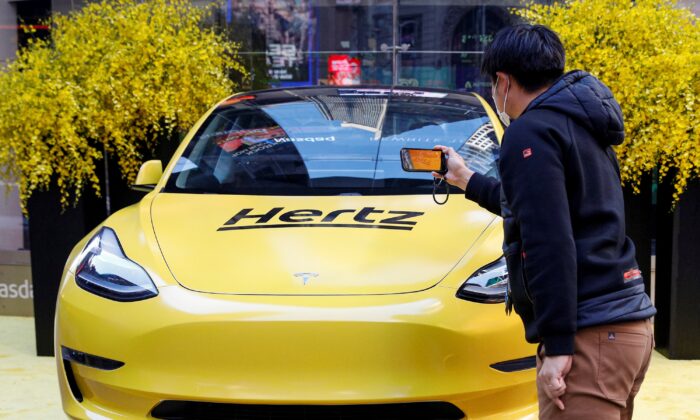


In the latest blow to America’s heralded transition to electric vehicles (EVs), car rental company Hertz announced it is selling off 20,000 EVs, or one-third of its electric fleet.
In its Jan. 11 filing with the Securities and Exchange Commission (SEC), Hertz announced that it will take a $245 million charge from offloading the EVs and will “reinvest a portion of the proceeds from the sale of EVs into the purchase of internal combustion engine (“ICE”) vehicles to meet customer demand.”
“The Company expects this action to better balance supply against expected demand of EVs,” Hertz stated in its filing. “This will position the Company to eliminate a disproportionate number of lower margin rentals and reduce damage expense associated with EVs.”
In short, many fewer customers than expected chose to rent EVs, and the repair costs for EVs were significantly higher than expected.
This action highlights two major problems with EVs: first, that Americans who need them for longer distances worry about how and where they can recharge them, and how long it would take. This concern is heightened for those who rent cars on family trips to parks or other remote locations and fear they may be stranded if the battery runs out.
The second concern is the higher cost of repairs if EV batteries become damaged. And because of the higher cost of repairs and the fact that even minor damage to EV batteries can cause insurers to total the entire vehicle, insurance rates for EVs are often significantly higher than those for gasoline-powered cars and trucks.
An April 2023 study by Consumer Reports found that “insurance companies are more likely to declare an EV a total loss after a crash [and] that has to do with the cost of replacing a battery that’s been damaged or compromised, which can be about half the cost of the vehicle.”
The study cites the example of a Chevrolet Bolt EV, which costs $78 more per year to insure than a Hyundai’s hybrid Ioniq Blue, and a Tesla Model 3 Long Range, which costs $470 more per year to insure than the comparable gas-powered Audi A4 2.0T Premium.
On the other hand, “there are a few EVs that could actually save you money in terms of insurance,” the report states. “A Nissan Leaf, for example, costs $35 less per year to insure than a Toyota Prius.”
A report from Progressive, an insurance company, states that part of the reason EVs cost more to insure is simply that they are more expensive to buy and more expensive to replace.
In addition, the insurer states, “Today’s electric vehicles also have fewer moving parts than conventional automobiles, but those parts can be pricey. If the battery pack is damaged, certain safety protocols are often necessary, adding more to the repair bill [and], there aren’t as many shops with technicians trained to fix electric vehicles versus traditional vehicles.”
A November 2023 study by Consumer Reports found that EVs were often less reliable than ICE vehicles, where manufacturers like Toyota, Honda, and Subaru have had decades to engineer cars and trucks with high-reliability standards.
For car rental companies like Hertz, all of this means losing money not only from the higher cost of repairs but also from the longer time that EVs are out of the rental fleet, not generating revenue.
Carmakers, Dealers Also Stepping Back
Hertz’s decision to downsize its EV fleet coincides with a retrenchment among carmakers and dealers regarding EVs.In December 2023, more than 3,000 car dealers issued a joint petition to the Biden administration asking for an end to the pressure on the industry to transition its fleets to EVs.
“Today, the supply of unsold BEVs [battery electric vehicles] is surging, as they are not selling nearly as fast as they are arriving at our dealerships—even with deep price cuts, manufacturer incentives, and generous government incentives,” the dealers wrote. “Mr. President, it is time to tap the brakes on the unrealistic government electric vehicle mandate.”
At the same time, automakers, including Ford, GM, Stellantis (formerly Chrysler), Mercedes, Honda, and others, are rethinking their investments in EV production. In 2023, Ford halted production of the electric Mustang Mach-E and paused its planned $12 billion investment in new EV production. GM announced that it would drop its production targets of 500,000 EVs over the next 12 months.
A February 2023 poll by the University of Chicago’s Energy Policy Institute found that only 19 percent of respondents said they were “very” or “extremely” likely to buy an EV, while about half said they wouldn’t buy an EV because of the cost, limited range, and worries about finding charging stations.
EV advocates say that education is part of the solution to get consumers on board with the transition to electric transportation. For those willing to rent EVs, the American Automobile Association (AAA) has some advice.
AAA states that EV renters should consider the paucity of charging stations relative to gas stations and map out where the electric charging stations are along the route they plan to take. In addition, AAA says, EV renters should know the “charging infrastructure” of the area where they will drive.
“Most EVs come with a charging cable and plug for use at home, but you may need additional cabling if you plan to use public charging stations,” AAA states. And while noting that EVs are “the eco-friendly option,” AAA reminds drivers that the “experience will be different” and “don’t forget about insurance!”
Hertz stated that it is not abandoning its EV fleet altogether and will continue to offer electric vehicles to customers who want them. It announced several initiatives to offer EVs in a way that is profitable to the company.
“These initiatives include the expansion of EV charging infrastructure, growing relationships with EV manufacturers, particularly related to more affordable access to parts and labor, and continued implementation of policies and educational tools to help enhance the EV experience for customers,” Hertz reported.


